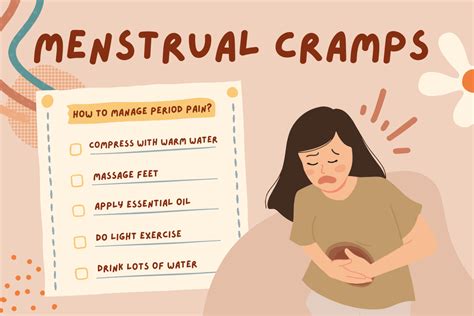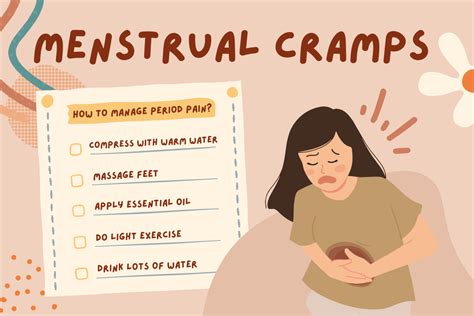Intro
Discover how long cramps last, including menstrual, muscle, and abdominal cramp duration, and learn about relief methods and prevention techniques for cramp management.
Menstrual cramps, also known as dysmenorrhea, are a common issue that many individuals who menstruate face every month. The severity and duration of cramps can vary greatly from person to person, and even from cycle to cycle. Understanding how long cramps last and what factors influence their duration can help individuals better manage their symptoms and find relief. The experience of menstrual cramps can be quite diverse, with some people experiencing mild discomfort and others dealing with severe pain that can interfere with daily activities.
For many, the onset of cramps is a clear signal that their period is about to start or has already begun. These cramps are primarily caused by the contraction of the uterus, which helps to shed its lining during menstruation. The duration of menstrual cramps can range from a few hours to several days, with the intensity often peaking in the first 24 hours of the menstrual cycle. Factors such as the individual's overall health, lifestyle, and the presence of any underlying medical conditions can influence the severity and duration of cramps.
The unpredictability of menstrual cramps can make them challenging to manage, as it's difficult to anticipate how long they will last and how severe they will be. However, understanding the underlying causes and recognizing the patterns of one's menstrual cycle can provide valuable insights. For instance, some individuals may find that their cramps are more severe during the initial days of their period and gradually decrease in intensity. Others might experience cramps that persist throughout their entire menstrual cycle, albeit with varying degrees of severity. By acknowledging these patterns and seeking appropriate medical advice, individuals can explore various management strategies to alleviate their discomfort.
Understanding Menstrual Cramps

Menstrual cramps are a natural part of the menstrual cycle for many, but their impact should not be underestimated. The pain is typically felt in the lower abdomen but can also radiate to the lower back and thighs. The primary cause of menstrual cramps is the release of prostaglandins, hormone-like substances that cause the uterus to contract. These contractions help the uterus shed its lining, which is then expelled from the body as menstrual flow. However, in some cases, the contractions can be so strong that they cut off the oxygen supply to the uterus, leading to pain.
Factors Influencing Cramp Duration
Several factors can influence the duration and severity of menstrual cramps. Age is one factor, with cramps often becoming less severe as individuals get older. Lifestyle factors, such as diet, exercise, and stress levels, can also play a role. For example, a diet rich in fruits, vegetables, and whole grains, along with regular physical activity, can help reduce the severity of cramps. Additionally, managing stress through techniques like meditation or deep breathing exercises can also provide relief.Managing Menstrual Cramps

There are several strategies for managing menstrual cramps, ranging from over-the-counter pain relievers to natural remedies. Over-the-counter medications such as ibuprofen and naproxen can be effective in reducing pain and inflammation. Heat therapy, such as applying a heating pad to the lower abdomen, can also help relax the uterine muscles and reduce pain. Dietary changes, including increasing intake of omega-3 fatty acids and reducing consumption of processed foods, may also help alleviate symptoms.
Natural Remedies for Relief
Natural remedies can offer an alternative or complementary approach to managing menstrual cramps. Herbal teas, such as ginger and peppermint, have anti-inflammatory properties that can help reduce pain. Exercise, particularly yoga, can help reduce stress and alleviate cramp symptoms. A warm bath or shower can also provide relief by relaxing the body and reducing muscle tension. It's essential to note that while these remedies can be beneficial, they may not work for everyone, and their effectiveness can vary.Lifestyle Changes for Cramp Management

Making lifestyle changes can be a proactive approach to managing menstrual cramps. Regular exercise, a balanced diet, and adequate sleep can help reduce the severity of cramps. Additionally, staying hydrated by drinking plenty of water can help prevent bloating and reduce discomfort. Avoiding or reducing caffeine and alcohol intake, especially during the menstrual cycle, can also help minimize symptoms. For some, keeping a menstrual diary to track the cycle and symptoms can provide valuable insights into patterns and potential triggers, allowing for more effective management strategies.
When to Seek Medical Advice
While menstrual cramps are a common experience, there are instances where seeking medical advice is necessary. If cramps are severe and interfere with daily activities, or if they are accompanied by heavy bleeding, fever, or vomiting, it's crucial to consult a healthcare provider. Certain underlying conditions, such as endometriosis or uterine fibroids, can cause severe menstrual cramps, and early diagnosis and treatment can significantly improve quality of life. A healthcare provider can offer personalized advice and treatment options, including hormonal therapies or other interventions, depending on the individual's specific needs and medical history.Conclusion and Next Steps

In conclusion, understanding the duration and management of menstrual cramps is crucial for individuals who experience them. By recognizing the factors that influence cramp severity and duration, and by exploring various management strategies, individuals can better cope with their symptoms. Whether through lifestyle changes, natural remedies, or medical interventions, there are numerous options available for alleviating menstrual cramp discomfort. It's essential for individuals to consult with a healthcare provider to discuss their specific situation and determine the most appropriate course of action.
Final Thoughts on Menstrual Health
Menstrual health is a critical aspect of overall well-being, and addressing menstrual cramps is just one part of maintaining good reproductive health. By prioritizing menstrual health, individuals can take significant steps towards improving their quality of life. This includes being open about menstrual experiences, seeking support when needed, and advocating for better understanding and resources for menstrual health issues. As awareness and discussion around menstrual health continue to grow, it's hopeful that more effective solutions and support systems will become available for those who need them.What are the primary causes of menstrual cramps?
+Menstrual cramps are primarily caused by the contraction of the uterus, which is triggered by the release of prostaglandins. These contractions help the uterus shed its lining during menstruation.
How long do menstrual cramps typically last?
+The duration of menstrual cramps can vary, but they often peak in the first 24 hours of the menstrual cycle and can last from a few hours to several days.
What are some effective ways to manage menstrual cramps?
+Effective management strategies include over-the-counter pain relievers, heat therapy, dietary changes, exercise, and natural remedies such as herbal teas and warm baths. It's also beneficial to maintain a healthy lifestyle, including a balanced diet, regular exercise, and adequate sleep.
We invite you to share your experiences and tips for managing menstrual cramps in the comments below. Your insights can help others who are looking for ways to alleviate their symptoms and improve their menstrual health. Additionally, if you found this article informative and helpful, please consider sharing it with others who might benefit from the information. Together, we can work towards creating a more supportive and understanding community around menstrual health issues.
